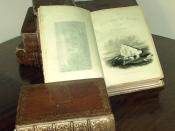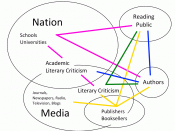Barthes essay in 1977 claimed that authorial interpretation was insignificant in finding meaning from any literary text, and the role of the reader was thus more important in interpreting a meaning. This brings up questions surrounding how much authorial intent is the foremost and only meaning a text can have, and then how much knowledge do we need of an author in order to interpret this intent, or whether readers differing meanings should be focused on and if these interpretations are any more or less valid than one which the author has intended. This essay will explore the idea of the author and the reader in literary texts, and also the problematic issue of language as a flawed medium which hangs over this authorial concern.
In "What Is An Author", Foucault claims that the author has a function of a description, serving as a way of classifying texts; 'a name can group together a number of texts and thus differentiate them from others' (Foucault 235).
This considers the author to repeatedly use a type of manner and discourse within their work which classifies it apart from other texts. Foucault surmises in his essay that a text has value attributed to it because of its association with the author (Foucault 243). Such a belief in the value of the author in texts within literary criticism also attributes the meaning to be found in a text to the author, which seems to imply that the author has a presence in their text. Even if the author has an intended meaning within the text which is to be valued as the only valid interpretation, the question then arises about how critics are to determine what this intention is. Wimsatt and Beardsley argue in 'The Intentional Fallacy' that 'judging a poem is like judging...



Good work
I like it. good details.
0 out of 0 people found this comment useful.